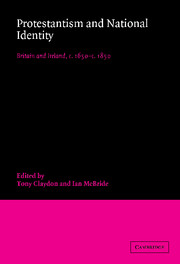Book contents
- Frontmatter
- Contents
- List of contributors
- Acknowledgements
- List of abbreviations
- Introduction
- England
- Britain and Ireland
- 6 The British dimension, religion and the shaping of political identities during the reign of Charles II.
- 7 The bible and national identity in the British Isles, c.1650–c.1750
- 8 Protestantism, presbyterianism and national identity in eighteenth-century Scottish history
- 9 Protestantism, ethnicity and Irish identities, 1660–1760
- 10 ‘The common name of Irishman’: protestantism and patriotism in eighteenth-century Ireland
- Britain, Ireland and the world
- Index
9 - Protestantism, ethnicity and Irish identities, 1660–1760
Published online by Cambridge University Press: 16 October 2009
- Frontmatter
- Contents
- List of contributors
- Acknowledgements
- List of abbreviations
- Introduction
- England
- Britain and Ireland
- 6 The British dimension, religion and the shaping of political identities during the reign of Charles II.
- 7 The bible and national identity in the British Isles, c.1650–c.1750
- 8 Protestantism, presbyterianism and national identity in eighteenth-century Scottish history
- 9 Protestantism, ethnicity and Irish identities, 1660–1760
- 10 ‘The common name of Irishman’: protestantism and patriotism in eighteenth-century Ireland
- Britain, Ireland and the world
- Index
Summary
In 1666, the first duke of Ormond, lord lieutenant of Ireland, regretted to see ‘men of birth’, many of them members of ‘the ancient nobility’ and some his own kinsmen, ‘incapable as well by their religion as education of those advantages and employments that would better become them than many that have them’. Ormond was a little premature in mourning the passing of old values such as lineage and personal fealty to the English king of Ireland. Only in 1704 under his grandson, the second duke, also viceroy, was a test act passed. There-after certificates of communion according to the rites of the established protestant church of Ireland were required for national and many local offices. The belated introduction of a sacramental qualification, thirty years after its English original, can be seen as another example of Ireland being made to conform to English ways. However, owing to the confessional imbalance in Ireland where probably no more than 10 per cent of its inhabitants adhered to the state church, the impact of the test was dramatic. If the measure was widely enforced – and there is evidence that it was, both against catholics and protestant dissenters – then it created the characteristic protestant ascendancy which subsisted until 1780. In practice, as has often been emphasised, it was not an inclusive protestant, but a narrow church of Ireland, dominance. Moreover, the term ‘ascendancy’ came into currency only when the system was collapsing, so that some would regard it as anachronistic to talk of an ‘ascendancy’ in Ireland before contemporaries used the word.
- Type
- Chapter
- Information
- Protestantism and National IdentityBritain and Ireland, c.1650–c.1850, pp. 206 - 235Publisher: Cambridge University PressPrint publication year: 1998
- 3
- Cited by



